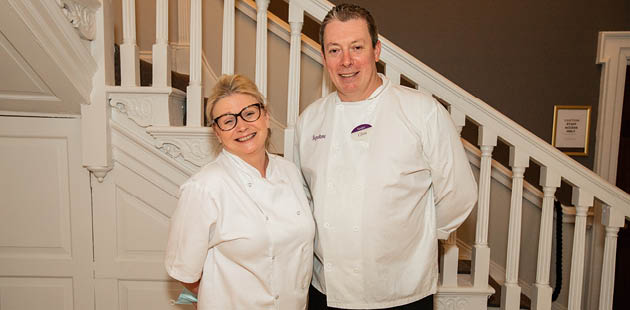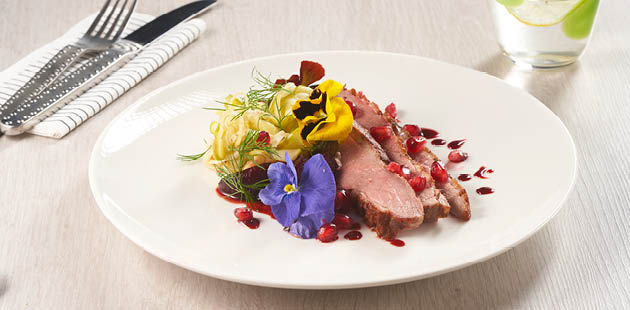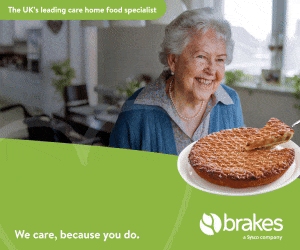Best in class: How MasterChef partnership is raising the bar
Lauren Fitchett meets BBC MasterChef winner Jane Devonshire, George O’Malley, head of customer experience at Signature, and Chris Burdett, its head of food and beverage, to talk about their drive for quality

Jane Devonshire is the first to admit that until she started working with Signature Senior Lifestyle, she didn’t know very much about care catering. She is, of course, not alone – for most people, their understanding and appreciation for what social care residents eat and drink blossoms when they experience it first hand, often when a loved ones enters a home.
But for the last four years, the 2016 BBC MasterChef winner has become an ambassador for the provider – and in many ways the wider sector – championing its work, developing its chefs and providing expertise when it comes to menu development. Having taken home her title in 2016, in the 12th series of the popular culinary competition, she brings fine dining expertise, contacts with top chefs and a familiarity to the public to Signature.
“I didn’t know anything about care catering at the time,” she says. “I had never worked with a care home before, and I have been blown away by the standard of food and the care that goes into it, including around dysphagia, the different levels and how good the chefs make the food look. That attention to detail has really moved me. I just remember my nan in a care home and what she ate. The more I have been involved, the more I have become passionate about it. Food is more than a plate of food – it’s so much more than nutrition, it’s memories, a lifetime of memories, and we want to push those buttons and excite people.”

Jane Devonshire with Chris Burdett
The partnership began at a time when Signature was keen to cement its reputation as a provider which puts food first. “Signature was at a point where we had been highlighted by the National Association of Care Catering (NACC) and the Great British Care Awards,” Burdett explains. “We wanted to have someone who is recognisable on board and we knew Jane was the right person. Residents and chefs can relate with and talk to her – she’s very much within the home community and she’s a lovely person, with these links to famous chefs.”
Fresh is best
It's clear within a few minutes of talking to O’Malley and Burdett that they are striving for quality. “We aim to provide something that’s best in class,” O’Malley summarises. “We know what good looks like and for me food is emotive, it evokes memories of childhood. There is of course a huge nutrition element, but for some people there may be one of two things in their day, and that may be food or an activity. Jane was a great fit. She’s still very much in the public eye and she knows good food and what good looks like. Of course, it works both ways – she wants to be associated with a strong brand too.”
“Good nutrition is essential to good care,” Burdett adds. “They go hand-in-hand – without one or the other it doesn’t work. Our approach is fresh is best, and we really do prefer to take a food first approach to health and wellbeing.”

A Signature duck breast dish
That ties in well with Devonshire’s approach. As an ambassador for Coeliac UK (more on that below), she is well aware how intrinsically food and health are linked. She has become a familiar face for Signature teams, both in a formal capacity – at new home openings and invention days – but also in an informal, friendly way. Burdett and Devonshire will often talk to discuss new ideas or inspiration.
“I’m not particularly rigid about it and neither are they,” Devonshire says. “An example of that was in lockdown – Signature wanted to do something online and so we were making knickerbocker glories online. I was at home making them and residents were joining in – it was great fun. I had one of those moments where my raspberry coulis went everywhere and we were all laughing.
“That’s really to me what the relationship is. I get involved really intensely in the chef training days – one the day I’ll do one-to-one work with the chefs, looking at how they can develop their food, such as filleting a trout or salmon, and thinking outside the box on dishes, talking about seasonality and local sourcing. We do promotional videos around the Christmas menus, or Chris might ring me up and brainstorm for a while. When they launch new homes I’ll go in and do demonstrations so people can see the dishes which will be on the menus.”
Signature’s invention days are often filmed, turned into glossy videos which are posted on social media and included on its website’s nutrition section. This not only introduces potential new resident and their families to what they do, but includes its online community in its menus. Its most recent invention day focused on creating its summer menu, and resulted in dinner dishes such as Greek lamb shoulder, slow roasted with garlic and rosemary and served with apricot couscous and mint yoghurt dressing.
Lunches included a grilled bream fillet, served with a warm salad of broad beans, shallots, cherry and plum tomatoes, fresh basil and a lemon butter fondue. Hungry yet? Us too. For breakfast, there was of course a full English, along with grilled English kippers with lemon and butter. Light bites such as sandwiches, jacket potatoes, a salad of the day, eggs cooked to order, Welsh rarebit and sardines in tomato sauce featured on an additional bistro menu.

One of Signature's dining rooms
Back to basics
Let’s go back a step, though. Signature’s menu design begins with O’Malley and Burdett, who set out broader ideas and design a 12-week cyclical menu. After, the provider’s development chef pin down the details, running it past specialists in nutrition and hydration and dementia care. Despite its size – it currently has 37 homes – Signature says it works to shop local, with more than two thirds of the ingredients its chefs use being locally sourced.
The end result is, Burdett says, a menu which focuses on seasonal, fresh cooking, balancing fine dining flair with traditional home comforts. Having previously worked in contract catering, he has now been with Signature for 11 years, and has witnessed changes across the sector. Summing up their approach, he gives the example of what he calls a 1980s-style deep-fried fish cake, saying: “Instead, our chefs would take a beautiful baked potato, scoop out the middle and mix it with smoked haddock and wilted spinach. I think a lot of what we do for our residents is around flavour layering.

The invention days challenge chefs to design creative menus
“Tastebuds start to decline at 21 so it’s really important we are not just serving up what we expect a dish to be. It’s all about flavour layering. We take chefs into the kitchen and, rather than getting them to make an incredible beef Wellington, ask them to focus on an amazing shepherd’s pie, with slow-cooked lamb and crushed potatoes instead of mash. One of our biggest challenges is we have a high percentage of residents that like home food, but, while we have people who do have to come to us, a lot choose to come to Signature as a lifestyle choice, so it’s up to us to show what else they can have.”
One area in which Devonshire certainly lends her expertise is allergens, and Coeliac disease in particular – she is ambassador for Coeliac UK and has written two gluten-free cookbooks. Her passion – and understanding – of the topic began when her youngest son was diagnosed aged two. She says the diagnosis, and subsequent dietary changes, made an almost immediate difference to him, and that she now cooks solely gluten-free food at home.
“I don’t think we should see gluten-free cooking and say ‘this is gluten-free’, we should just think it’s delicious,” she says. “That’s my perspective for much of my cooking – it’s not cooking for a certain demographic, elderly people for example, it’s delicious food.”
Bringing menus to life
Activities, occasions and themes – you know well that dates in the diary not only provide the perfect opportunity to bring residents together, but are also a chance to liven up your menus. Burdett says Signature is no different, with activities playing a big role in shaping kitchen menus – dishes are themed around national days, birthdays and events such as cheese and wine nights.
Elsewhere, monthly forums seek residents’ feedback on menus, and at other meetings residents from different homes are brought together to share their thoughts from different vantage points. But O’Malley, whose background is in hotels, says he is keen for chefs to be visible for residents, so feedback can be given immediately.

Chris Burdett teaching chefs
“We encourage chefs to go out and talk to residents,” he says. “If there is a problem we can solve it much earlier by doing so. We set our own expectations and we need to deliver on that. That consistency over 37 homes needs to be there.”
Devonshire says the level of service is no different to that found in other areas of hospitality. “Chefs are interacting with residents and that’s so important – sometimes not in the easiest of circumstances,” she says. “It’s not always easy and it isn’t in any form of hospitality, but that doesn’t mean our customers shouldn’t get a beautiful level of food.”
After all, hospitality and care catering are growing ever-closer together – the move towards a better work-life balance and changing perceptions around food in social care are seeing more chefs from hotels and restaurants making the leap. While Signature is not exempt from the recruitment difficulties facing the sector, O’Malley says it is seeing more and more joining from hospitality backgrounds, in particular hotels.
It’s a transition that Burdett has experienced first hand. “I never thought I would come into care,” he says. “I never wanted to because of what I thought the standards and food were like. I quickly found that Signature is very bespoke, with a vision to grow into the very best care provider with the best food and drink offering. Things have changed over the last 10 years.”
Devonshire agrees that there is an ill-founded and unfair stigma around care catering, which needs to change. “When chefs say they work in a care home, people can sometimes think they have taken an easy option, and that’s not the case at all,” she says. “They have so many challenges to face. There are so many things they have to think about, a million things. It’s been a big learning curve.
“[The partnership] is a huge honour to me as I’m very passionate about elderly care. We have all dealt with loved ones who have had to go into care for different reasons, be it Alzheimer’s or wanting more independence but needing that support to do so. It’s been wonderful – it really is one of my favourite jobs.”








